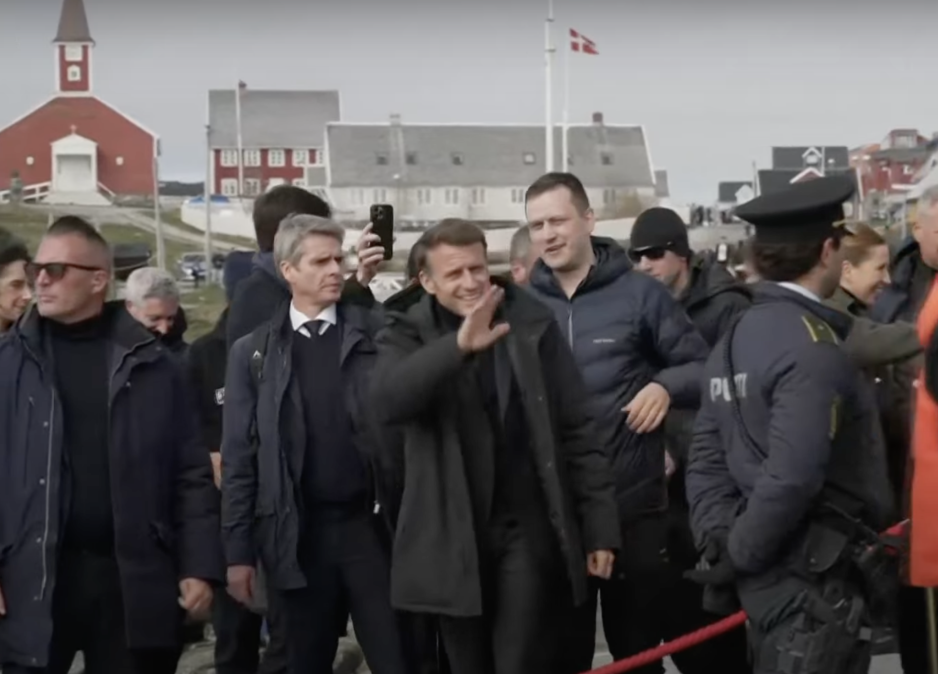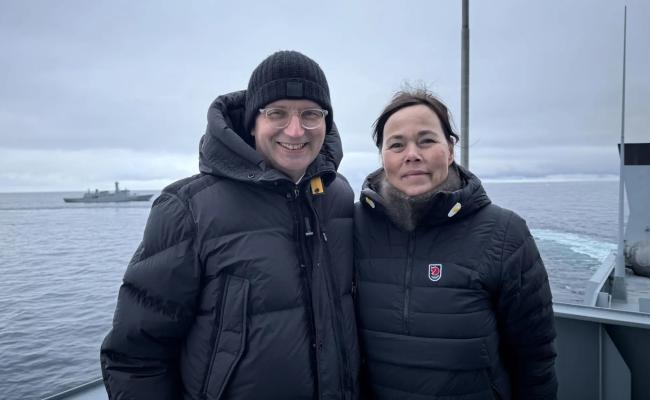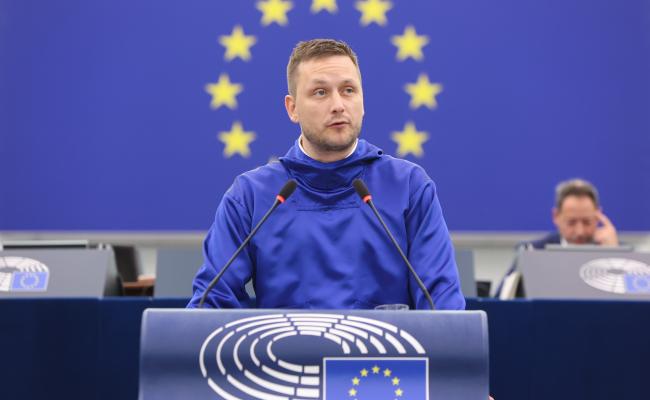Op-ed: Greenland is Not a Danish Domestic Issue - It is Europe’s Next Sovereignty Test

French President Macron and Greenlandic Premier Nielsen walking to the joint press conference in Nuuk, Greenland. (Source: APT News/screenshot)
This is an op-ed written by an external contributor. All views expressed are the author's own
Washington has stopped joking about "buying" the world’s largest island and is building leverage the slow way - through diplomacy, money, bases, and narrative - while insisting it will "get Greenland one way or the other" and promising to "make you rich".
Brussels’ answer so far has been procedural - "we are not negotiating" - and rhetorical - "free of pressure". That is not a strategy. It is how the periphery of Europe gets reshaped without Europe noticing until it is too late.
If you want to understand creeping annexation, do not look north first; look east, to the Turkish model in northern Cyprus.
For five decades Ankara has converted a military fait accompli into a durable political reality using civilian instruments: settlement, infrastructure, and irreversible urban planning.
The water pipeline from Anatolia bound the occupied north to Turkey’s utilities; the partial reopening of Varosha broke UN lines and rewrote incentives on the ground; and the European Court of Human Rights has long treated Turkey as exercising "effective control" in the area.
Now read the Greenland file through that lens
Brussels condemned; the facts stayed - law on paper, dependence in practice.
Now read the Greenland file through that lens.
The United States has restored permanent diplomatic presence in Nuuk, re-energised trilateral frameworks with Copenhagen and Naalakkersuisut, and made Pituffik (formerly Thule) a Space Force hub whose early-warning radars sit at the centre of homeland defence - and whose vulnerabilities to modern threats are being used in Washington as a case for more footprint, not less.
Denmark’s new Defence Cooperation Act gives the US broad, legally grounded access to Danish bases while leaving the Realm’s Arctic policy intact; the message is continuity with more capacity. These are facts on the ground built with signatures and budgets.
Denmark has done its part - responsibly, predictably, and within the spirit of the Self-Government Act recognising Greenlandic self-determination.
Also read (The text continues)
The fault lies not in Copenhagen but in Brussels, which still frames Greenland as a side matter when it is a continental test of dependency - precisely as Washington deepens its Arctic reach.
Brussels knows the stakes and even has tools: it opened a permanent office in Nuuk in 2024, signed a raw-materials partnership, and brought Greenland under the Critical Raw Materials Act to de-risk supply chains. Yet Greenland is not part of the Union.
It left the European Community in 1985 and remains an Overseas Countries and Territories (OCT) partner - connected to Europe, not governed by it. That limits Brussels to persuasion, not authority: every initiative runs through Copenhagen and Nuuk.
Europe persuades, Washington acts - and in that space, the United States advances.
The politics in Greenland are not nebulous. In January, an overwhelming 85% of Greenlanders rejected becoming part of the United States, and Danish and Greenlandic leaders have been unambiguous that Greenland is not for sale.
Presence and capital shape outcomes.
Yet the more Washington frames the island’s future as a choice between vulnerability and American protection, the more Europe must answer with tangible alternatives - connectivity, skills, investment - rather than applause lines.
Polling and podiums buy time; presence and capital shape outcomes.
Events of the last few weeks underline the pace mismatch. The new US ambassador to Denmark took up post this week amid intensified US Arctic messaging, while Defence News reporting on hypersonic vulnerabilities at Pituffik is already being read into force-posture arguments.
Europe’s answer cannot be a press release.
The comparison to northern Cyprus is not hyperbole; it is a warning about method. Ankara did not "annex" with a speech - it accumulated dependencies until the cost of reversal exceeded the weight of law.
Also read (the text continues)
In the North Atlantic, America’s method is emphatically within alliance comity and with Greenlandic and Danish consent. That is precisely why it is potent - soft annexation is not about flags but about making the alternative - distance from the US - feel risky, lonely, and expensive.
Europe will not beat that with communiqués; only with offers that arrive on time and on budget.
What should those offers look like?
Start where Greenland has already signalled it wants partners: critical-minerals projects that meet Greenlandic environmental law and social licence; energy and telecoms infrastructure that binds communities to markets; aviation and maritime connectivity that uses Nuuk’s new international airport as a hub for science, trade, and tourism - with the value accruing in Greenland.
The EU has the legal base for this through the Overseas Countries and Territories decision and the new CRMA; it lacks only the scale and tempo. Set measurable targets, put an EU-Greenland facility inside the European Investment Bank, and move from MoUs to FIDs.
Translate that symbolism into a sustained European presence that Greenlanders can see
Paris has shown how to show up: President Macron flew to Nuuk this summer and said, simply, that Greenland is not a commodity and Europe is a partner. Good.
Now translate that symbolism into a sustained European presence that Greenlanders can see: scholarships that fill classrooms; grid projects that lower bills; equity that de-risks local firms; procurement that buys Greenlandic services first.
Make "Europe" visible in Nuuk without crowding out Denmark or bypassing Greenlandic institutions. That is how you inoculate against the narrative of inevitability.
Finally, widen the aperture. The periphery where Europe is most permeable to "friendly faits accomplis" is not only in the Arctic. It includes islands and chokepoints embedded in the Union’s own legal order.
Malta wrote neutrality into its Constitution after 1979 and guards it jealously; the US already projects power across the Mediterranean from Souda Bay and Rota, and across the Atlantic from the Azores.
None of that is malign; all of it is a reminder that where the Union’s presence is thin, someone else’s will be thick.
Brussels should treat Malta’s neutrality as a European asset to be underpinned, not an alibi to be ignored. Support what members and OCTs want to keep - autonomy - and offer what they need to resist pressure - alternatives.
If Brussels sees this as "a Copenhagen problem", it will replay its Cyprus reflex - resolutions without leverage, principles without power.
If it treats Greenland as European strategic terrain, it can anchor a partnership that leaves no space for soft annexation because the hard work of presence has already been done.



